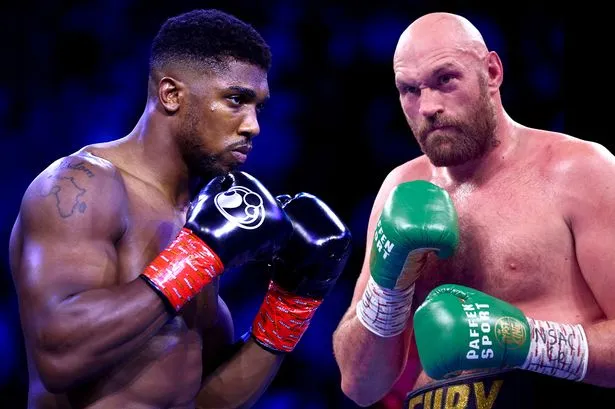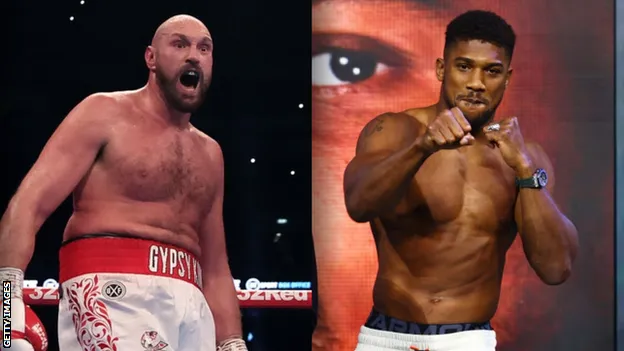Boxing is no stranger to grand spectacles, overhyped storylines, and money-driven narratives. But few modern sagas have drawn as much attention—or as much skepticism—as the seemingly never-ending build-up to Anthony Joshua vs. Tyson Fury. Once hailed as a potential “Fight of the Century,” this heavyweight showdown has devolved into a media circus, riddled with broken promises, public manipulation, and a stunning lack of in-ring action. While fans once fantasized about two British titans clashing for undisputed glory, today many are beginning to see the truth: Joshua and Fury are two overrated egos whose drama may have more bark than bite.
Rather than delivering the showdown boxing desperately needs, both fighters have built careers on curated reputations, commercial deals, and a carefully protected façade of dominance. In reality, the Joshua-Fury rivalry might just be the biggest heavyweight farce of the modern era—masquerading as a superfight while providing little more than smoke and mirrors.
Anthony Joshua’s decline: From golden boy to questionable contender
Anthony Joshua once symbolized the rebirth of British heavyweight boxing. With an Olympic gold medal in 2012 and a string of knockouts early in his career, he quickly became a media darling and commercial juggernaut. Sponsors lined up, promoters praised him, and fans filled stadiums. For a time, it looked like Joshua was destined for greatness.

But under the spotlight, cracks began to show. His victory over an aging Wladimir Klitschko in 2017 was certainly a career high, but it also exposed flaws in his stamina and composure. More troubling was the devastating upset loss to Andy Ruiz Jr. in 2019—a fight in which Joshua looked vulnerable, confused, and tactically inept. Though he avenged the loss in the rematch, the aura of invincibility was gone.
His two consecutive losses to Oleksandr Usyk, a natural cruiserweight, further tarnished his image. Despite superior size and power, Joshua struggled to adapt, failing to impose himself physically or strategically. These performances raised questions about his ring IQ and mental toughness. Is Joshua truly an elite heavyweight? Or has he been overhyped by a machine that prioritized brand over ability?
Despite setbacks, Joshua remains a box-office attraction. But many now see him as a manufactured product—more interested in being a celebrity than chasing true boxing greatness.
Tyson Fury’s act: Brilliance, bluster, and baffling contradictions
If Joshua is the polished corporate product, Tyson Fury is his chaotic counterbalance—unfiltered, unpredictable, and seemingly unbeatable. After shocking the world by outboxing Wladimir Klitschko in 2015, Fury disappeared into a haze of addiction, depression, and inactivity. His comeback in 2018 was nothing short of remarkable, culminating in a brutal trilogy with Deontay Wilder that reestablished him as one of the top heavyweights on the planet.
But for all his talent, Fury is also a master manipulator. He plays the role of the fan-friendly fighter, calling out opponents and claiming to fight “for the people,” only to pull out of negotiations, shift goalposts, or stage theatrical retirements. His self-proclaimed status as the “baddest man on the planet” often rings hollow when he avoids high-stakes fights with Joshua or Oleksandr Usyk.
Even Fury’s record is suspect upon closer examination. Aside from Wilder and Klitschko, his resume lacks top-tier names. His most recent performances—especially against Francis Ngannou, an MMA fighter making his boxing debut—were underwhelming and raised doubts about his current conditioning and commitment.
For all his bluster, Fury has done more to stall boxing’s heavyweight momentum than accelerate it, crafting a persona that thrives on headlines while dodging genuine risk.
Hype over substance: The marketing of a “superfight”
For years, the boxing world has waited for a Fury vs. Joshua clash, a fight that could unify the belts, electrify stadiums, and revive the sport’s mainstream appeal. Yet, the closer it comes, the more hollow it seems. What was once billed as a showdown between the two best heavyweights in the world now feels more like a money-grabbing exhibition, built on nostalgia and national pride rather than current form or relevance.
The marketing machine continues to push this matchup as a generational event. Yet neither man currently holds the WBA, IBF, WBO, or The Ring titles—all of which belong to Oleksandr Usyk. In truth, the Joshua-Fury narrative now exists more on social media than in sport. Behind-the-scenes negotiations have failed time and time again, with both sides blaming the other in carefully scripted PR campaigns.
What’s become painfully clear is this: the “superfight” is less about competition and more about protecting egos, maximizing profits, and avoiding accountability.
Fans are being sold a dream rooted in the past. In today’s heavyweight landscape, fighters like Usyk, Zhilei Zhang, and even Jared Anderson are more relevant than the tired soap opera between Fury and Joshua.
Three chances, zero results: A history of failed negotiations
Let’s recap the major breakdowns in the Joshua-Fury saga:
2020: After Fury defeated Wilder and Joshua beat Pulev, a summer 2021 date in Saudi Arabia was allegedly finalized. But an arbitration ruling forced Fury into a third Wilder fight, and the bout was shelved.
2022: Following Joshua’s second loss to Usyk, Fury offered him a fight in December. Joshua accepted in principle, but negotiations quickly collapsed over deadlines and contract disputes.
2023–2024: Fury teased a fight with both Joshua and Usyk but ultimately avoided commitments. Fans watched in disbelief as Fury instead pursued easier paydays like Ngannou, drawing criticism from the boxing community.
Every time the fight is “close,” something gets in the way—greed, pride, or pure posturing. And fans are left wondering whether the fight was ever real, or just another tool in the promotion playbook.
The mental game: Ego vs. accountability
Perhaps the most frustrating part of this saga is the endless spin. Fury paints himself as the fearless warrior, blaming failed fights on others while sidestepping any accountability. Joshua, on the other hand, says little, hides behind his management team, and projects the image of a composed professional—though fans increasingly see it as passivity.
The irony? Both fighters accuse the other of ducking.
Fury calls Joshua a “bodybuilder” with no heart.
Joshua implies Fury is a mental flake who talks a good game but never shows up.
These constant accusations and reversals have alienated fans, who are tired of the ego-driven theatrics and just want to see fists fly.
In truth, both fighters are now more brand than boxer. And their unwillingness to risk their status against each other has transformed a dream fight into a tired drama.
Fan fatigue: The turning point for public perception
Once the darlings of the British boxing public, both Fury and Joshua now face a credibility crisis. Fans are no longer willing to be patient. They want action, not excuses. Many now view these two not as heroes of the sport, but as symbols of boxing’s broken system—where business trumps bravery and spin trumps substance.

Social media sentiment reflects this shift:
“They’ve been ducking each other for five years.”
“Just retire already if you’re not going to fight.”
“Usyk is the real champ.”
This growing backlash isn’t just emotional—it’s logical. Why should fans invest in a fight that neither man seems willing to make happen? And if they do finally clash, will it even matter?
The clock is ticking—and so is relevance
Neither Fury nor Joshua is getting younger. Fury has flirted with retirement and admitted to lacking motivation. Joshua, despite his chiselled physique, has taken significant punishment in recent years. Meanwhile, the division is moving on. Usyk’s dominance, Dubois’ resurgence, and the rise of international contenders are reshaping the heavyweight landscape.
If the fight doesn’t happen in 2025, it may lose all meaning. What was once a potential all-time great matchup could soon become just another “what could have been.”
Final Thoughts: A superfight in name only
Anthony Joshua vs. Tyson Fury is a fight that should define an era—but it now risks becoming its greatest disappointment. Both fighters, once symbols of greatness, are increasingly seen as inflated personas whose actions have failed to live up to the hype.
Whether it’s Joshua’s carefully managed image or Fury’s erratic antics, neither man has done enough to deliver the fight fans crave. And until they put egos aside, step into the ring, and actually compete, the world will continue to see their rivalry not as a clash of titans—but as a cautionary tale of overrated egos in a heavyweight farce masquerading as a superfight.





